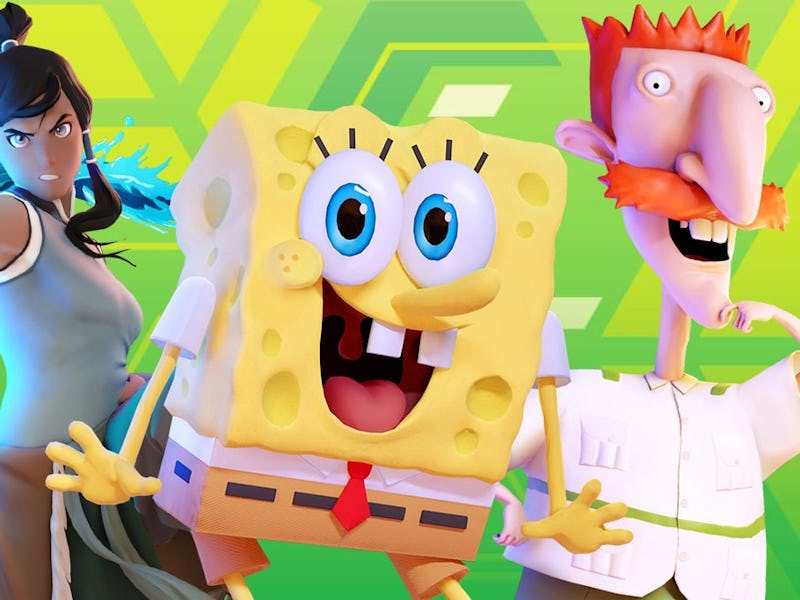Warner Bros. fighting game breathes new life into a underrated genre
The Super Smash Bros. clone is here to stay.

Gandalf fighting Batman, Mad Max, and Shaggy from Scooby-Doo sounds like an impossible fever dream. And yet, that’s closer to reality than you might think. While such an idea would seem farfetched just a few years ago, the Super Smash Bros. clone is becoming a more common subgenre for licensed video games. And given the recent success of Nickelodeon All-Star Brawl, it looks like another major media brand may be entering the fray.
Nickelodeon All-Star Brawl was released in early October to surprisingly positive reviews and a passionate community. Now, there are rumors that Warner Bros. is getting in on the action with a Smash clone that could feature characters like Shaggy, Gandalf, and Mad Max.
The response to Nickelodeon All-Star Brawl and premature buzz around this rumored WB fighter demonstrate that the Smash clone might be the future of licensed video games.
The forerunners — Super Smash Bros. Ultimate mixes platformer and fighting game mechanics to create an experience that’s accessible to casual players and yet it also has an extremely high skill ceiling. The Smash Bros. series has had a passionate community for decades. The series’ popularity has also inspired many indie clones over the years.
MediaeditEdit Mediamore_vert
- AltSora in Super Smash Bros. Ultimate
- AttributionNintendo
- Attribution Urlno Attribution Url
- CaptionSora’s inclusion in Super Smash Bros. Ultimate proves that even Disney isn’t immune to the appeal of Smash Bros.
From Rivals of Aether to Brawlout to Rushdown Revolt, there’s no shortage of platform fighters and developers that know how to make them. Ubisoft’s Brawhalla also found popularity as a free-to-play Smash clone that featured crossovers with everything from Adventure Time to the WWE.
More large corporations with vast amounts of IP are starting to notice that this formula works. Nickelodeon All-Star Brawl channels the best parts of Smash into a fighting game that, while lacking some polish, is still incredibly fun to pick up and play.
That’s why it wasn’t too surprising when rumors of a WB Games Smash clone popped up on Reddit. An anonymous poster claims that WB Games commissioned Mortal Kombat and Injustice developer NeatherRealm to make a tag-team Smash clone featuring WB characters.
The Reddit post specifically teases characters like Shaggy, Gandalf, Tom & Jerry, Batman, Fred Flinstone, Mad Max, Harry Potter, Ron Weasley, and Johnny Bravo. Venture Beat journalist Jeff Grubb confirmed the game’s existence on Twitter but said NeatherRealm isn’t the one making it.
Regardless of the developer, it’s clear that the Smash clone is the latest fad to hit licensed video games.
Why this is happening — People will be interested in and pay for games that feature their favorite characters. Fighting games can include large rosters of characters from a variety of franchises. In particular, the subgenre of Smash clones also has more casual-oriented gameplay that makes it appealing to a broader audience.
They’re also games that can generate interest long after launch. Nickelodeon All-Stars Brawl highlights that these games can manifest passionate fighting game communities and be played in tournaments. Super Smash Bros. Ultimate also provides a post-launch support model that will generate buzz as fans speculate who could be added next.
MediaeditEdit Mediamore_vert
- AltNickelodeon All-Star Brawl Reptar vs. Powdered Toastman
- AttributionGameMill Entertainment
- Attribution Urlno Attribution Url
- CaptionCharacters like Garfield and Shredder are reportedly coming to Nickelodeon All-Star Brawl post-launch.
Those elements all cause a perfect storm that’s perfect for franchise crossovers, making it a prime genre for licensed games that can take advantage of popular and dormant IP. And Super Smash Bros. Ultimate sold over 24.77 million copies, so it’s proven that these kinds of games can succeed.
For companies like Nickelodeon or WB that own many iconic series and characters, putting them all in one game is an obvious move with some potentially lucrative results.
Licensed games, especially ones for children’s shows and movies, often have a negative stigma surrounding them. By embracing the Smash clone formula, these titles have a much greater chance of becoming beloved titles that pop up in tournaments for years to come, rather than just being flash-in-the-pan cash grabs.